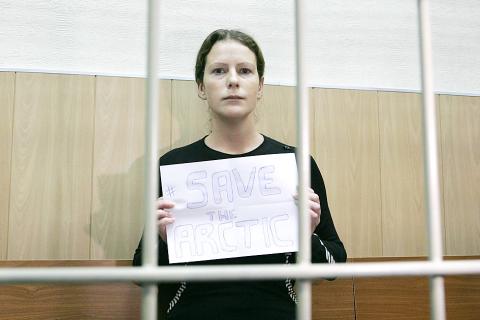Russia on Wednesday dropped piracy charges against 30 people involved in a Greenpeace protest against Arctic oil drilling, replacing them with lesser offenses and cutting the maximum jail sentence they face to seven years from 15.
The charges against the activists who protested at a Gazprom oil platform off Russia’s northern coast last month have been changed from piracy to hooliganism, the Russian Investigative Committee said in a statement.
Greenpeace said the new charges were still “wildly disproportionate” and promised to contest them.

Photo: Reuters / Igor Podgorny / Greenpeace
All 30 people who were aboard the Greenpeace ship Arctic Sunrise during the Sept. 18 protest, in which activists tried to scale the Prirazlomnaya platform, are being held in detention in the northern Murmansk region until at least late next month.
The Investigative Committee said it had begun the procedure of pressing the new charges, which carry a maximum sentence of seven years in prison. The piracy charges were punishable by 10 to 15 years.
Greenpeace called the hooliganism charge “nothing less than an assault on the very principle of peaceful protest.”
“This is still a wildly disproportionate charge that carries up to seven years in jail,” Vladimir Chuprov of Greenpeace Russia said in a statement. “We will contest the trumped up charge of hooliganism as strongly as we contested the piracy allegations. They are both fantasy charges that bear no relation to reality. The [activists] are no more hooligans than they were pirates.”
Russian President Vladimir Putin has said the activists were clearly not pirates, but that they violated international law.
The Investigative Committee dismissed Greenpeace’s claim that the protest was peaceful, saying “anyone who illegally and premeditatedly seizes ... a stationary platform is committing a crime, no matter what their motive.”
The committee said the investigation was continuing and reiterated an earlier statement that it could still bring additional severe charges against some of the activists, including the use of force against representatives of the state.
Courts in the Russian city of Murmansk have denied bail to the people of 18 different nationalities who were detained — 28 activists, including the crew of the Arctic Sunrise and two freelance journalists who were documenting the protests.
Greenpeace has said the arrests and charges are meant to frighten off campaigners protesting against drilling in the Arctic, a region Putin describes as crucial to Russia’s economic future and its security.
Moscow says the environmental protesters violated a security zone around Prirazlomnaya, which is Russia’s first offshore oil platform in the Arctic and is scheduled to begin production by the end of the year.
The US believes “the purpose and nature of the actions taken by the defendants in attempting a peaceful protest should be fully taken into account as the Russian investigation proceeds,” US Department of State spokeswoman Marie Harf said.
“We are going to continue monitoring it closely,” she said at a daily briefing.

Nauru has started selling passports to fund climate action, but is so far struggling to attract new citizens to the low-lying, largely barren island in the Pacific Ocean. Nauru, one of the world’s smallest nations, has a novel plan to fund its fight against climate change by selling so-called “Golden Passports.” Selling for US$105,000 each, Nauru plans to drum up more than US$5 million in the first year of the “climate resilience citizenship” program. Almost six months after the scheme opened in February, Nauru has so far approved just six applications — covering two families and four individuals. Despite the slow start —

MOGAMI-CLASS FRIGATES: The deal is a ‘big step toward elevating national security cooperation with Australia, which is our special strategic partner,’ a Japanese official said Australia is to upgrade its navy with 11 Mogami-class frigates built by Japan’s Mitsubishi Heavy Industries, Australian Minister for Defence Richard Marles said yesterday. Billed as Japan’s biggest defense export deal since World War II, Australia is to pay US$6 billion over the next 10 years to acquire the fleet of stealth frigates. Australia is in the midst of a major military restructure, bolstering its navy with long-range firepower in an effort to deter China. It is striving to expand its fleet of major warships from 11 to 26 over the next decade. “This is clearly the biggest defense-industry agreement that has ever

North Korean troops have started removing propaganda loudspeakers used to blare unsettling noises along the border, South Korea’s military said on Saturday, days after Seoul’s new administration dismantled ones on its side of the frontier. The two countries had already halted propaganda broadcasts along the demilitarized zone, Seoul’s military said in June after the election of South Korean President Lee Jae-myung, who is seeking to ease tensions with Pyongyang. The South Korean Ministry of National Defense on Monday last week said it had begun removing loudspeakers from its side of the border as “a practical measure aimed at helping ease

DEADLY TASTE TEST: Erin Patterson tried to kill her estranged husband three times, police said in one of the major claims not heard during her initial trial Australia’s recently convicted mushroom murderer also tried to poison her husband with bolognese pasta and chicken korma curry, according to testimony aired yesterday after a suppression order lapsed. Home cook Erin Patterson was found guilty last month of murdering her husband’s parents and elderly aunt in 2023, lacing their beef Wellington lunch with lethal death cap mushrooms. A series of potentially damning allegations about Patterson’s behavior in the lead-up to the meal were withheld from the jury to give the mother-of-two a fair trial. Supreme Court Justice Christopher Beale yesterday rejected an application to keep these allegations secret. Patterson tried to kill her